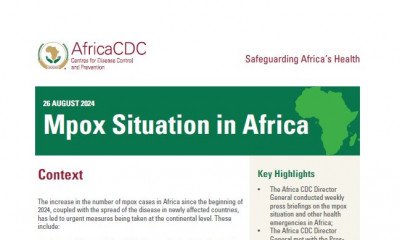A New Era of Health Collaboration: Launching PAMTA
The Africa Centres for Disease Control and Prevention (Africa CDC) and the European Commission have announced the launch of the Partnership to Accelerate Mpox Testing and Sequencing in Africa (PAMTA). This initiative marks a significant step forward in strengthening health systems across the continent, particularly in response to the Mpox outbreak. The collaboration is designed to enhance diagnostic capabilities, improve outbreak detection, and support long-term public health resilience.
PAMTA is co-funded under the EU4Health 2024 Work Programme, highlighting the growing partnership between Africa and Europe in addressing global health challenges. The project will receive €9.4 million in funding, allocated to Africa CDC and the African Society for Laboratory Medicine (ASLM), with implementation managed by the European Health and Digital Executive Agency (HaDEA). The initiative officially began on 1 June 2025 and will run for three years, focusing on critical areas such as testing, sequencing, training, and local manufacturing of medical tools.
Strategic Objectives of PAMTA
The initiative has four main goals aimed at improving Africa’s ability to respond to outbreaks:
- Scaling up Mpox testing: The program aims to support over 150,000 tests across the continent, ensuring more people can be diagnosed quickly.
- Strengthening genomic sequencing capacity: This will allow for better tracking of how the virus evolves and spreads, helping to inform public health strategies.
- Building human resource capacity: Training programs will focus on molecular diagnostics, genomics, bioinformatics, and data interpretation, creating a skilled workforce ready to tackle future health threats.
- Promoting local production of testing kits: By encouraging the development and validation of locally made diagnostic tools, PAMTA supports sustainable healthcare solutions tailored to African needs.
Africa CDC Director General, H.E. Dr Jean Kaseya, praised the initiative as a timely and strategic move to bridge the diagnostic gap in Africa. “This partnership reflects our commitment to working with trusted partners to build agile and self-reliant public health systems across Africa,” he said. “Together with the EU and our technical partners, we are setting a new benchmark for outbreak detection and response.”
A Historic Step in EU-Africa Cooperation
PAMTA represents a historic milestone as the first joint initiative signed between the European Commission and Africa CDC. Laurent Muschel, Deputy Head of DG HERA, emphasized the importance of this collaboration. “Building on HERA’s earlier donation of Mpox vaccines, this action enables a critical next step: strengthening diagnostic capacities as part of a broader medical countermeasures approach,” he said. “It reflects our shared commitment to reinforcing epidemic preparedness across Africa — from vaccines to diagnostics, from innovation to manufacturing.”
This initiative demonstrates the power of collaboration between the African Union and the European Union. By combining resources, expertise, and innovation, both regions are working together to protect lives and build resilient health systems.
Broader Efforts to Combat Mpox
The launch of PAMTA builds on existing efforts by the EU and its partners to address the Mpox outbreak. By mid-2025, more than 600,000 vaccine doses had been delivered to African countries through HERA and Team Europe. In addition, research initiatives like MPX-RESPONSE and EDCTP3 are exploring new therapeutic options to combat the disease.
Another key project, the Africa Pathogen Genomics Initiative (PGI), also funded through EU4Health, is enhancing public health laboratory networks and genomic surveillance across the continent. This work is being done through public-private partnerships, ensuring that Africa is well-equipped to monitor and respond to emerging pathogens.
Long-Term Impact on Health Resilience
PAMTA is not just about addressing the current Mpox outbreak; it is also about building long-term health resilience. By supporting comprehensive diagnostics and fostering local innovation, the initiative is laying the foundation for Africa’s future pandemic preparedness and response capabilities.
Through this partnership, Africa and Europe are demonstrating what can be achieved when they work together. With a focus on science, technology, and sustainable solutions, PAMTA sets a powerful example for global health cooperation.
 Info Malang Raya Its All About World News
Info Malang Raya Its All About World News




